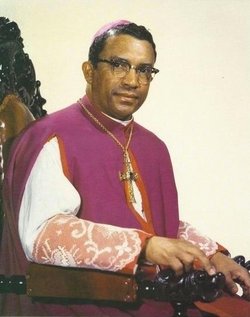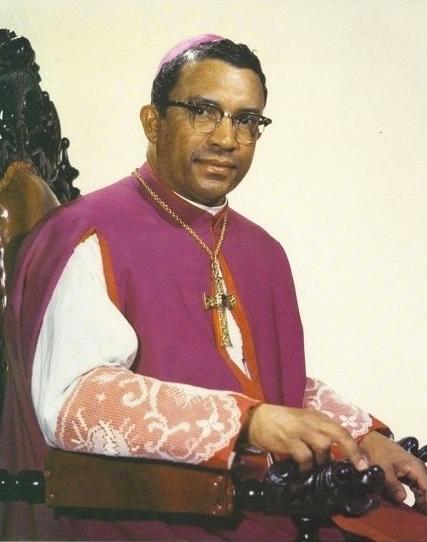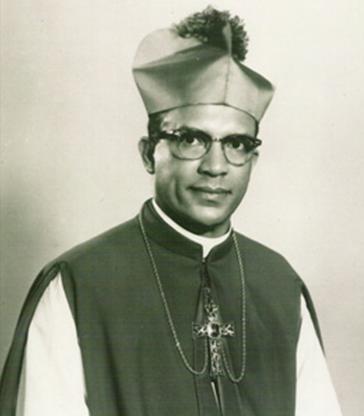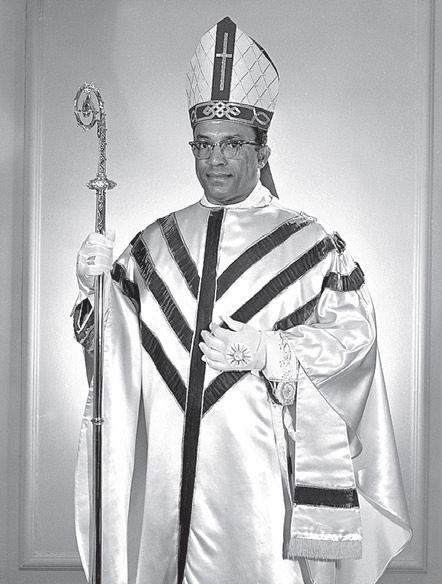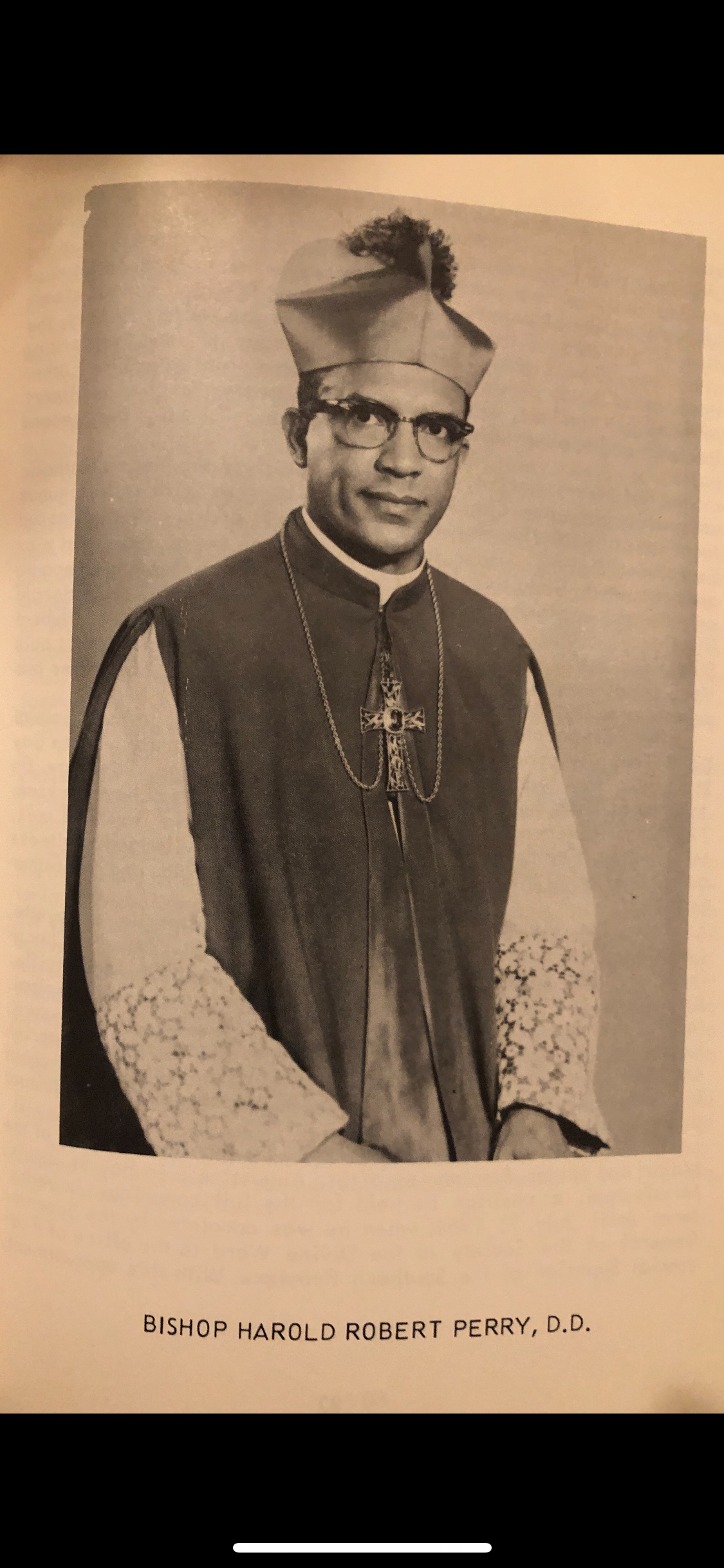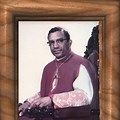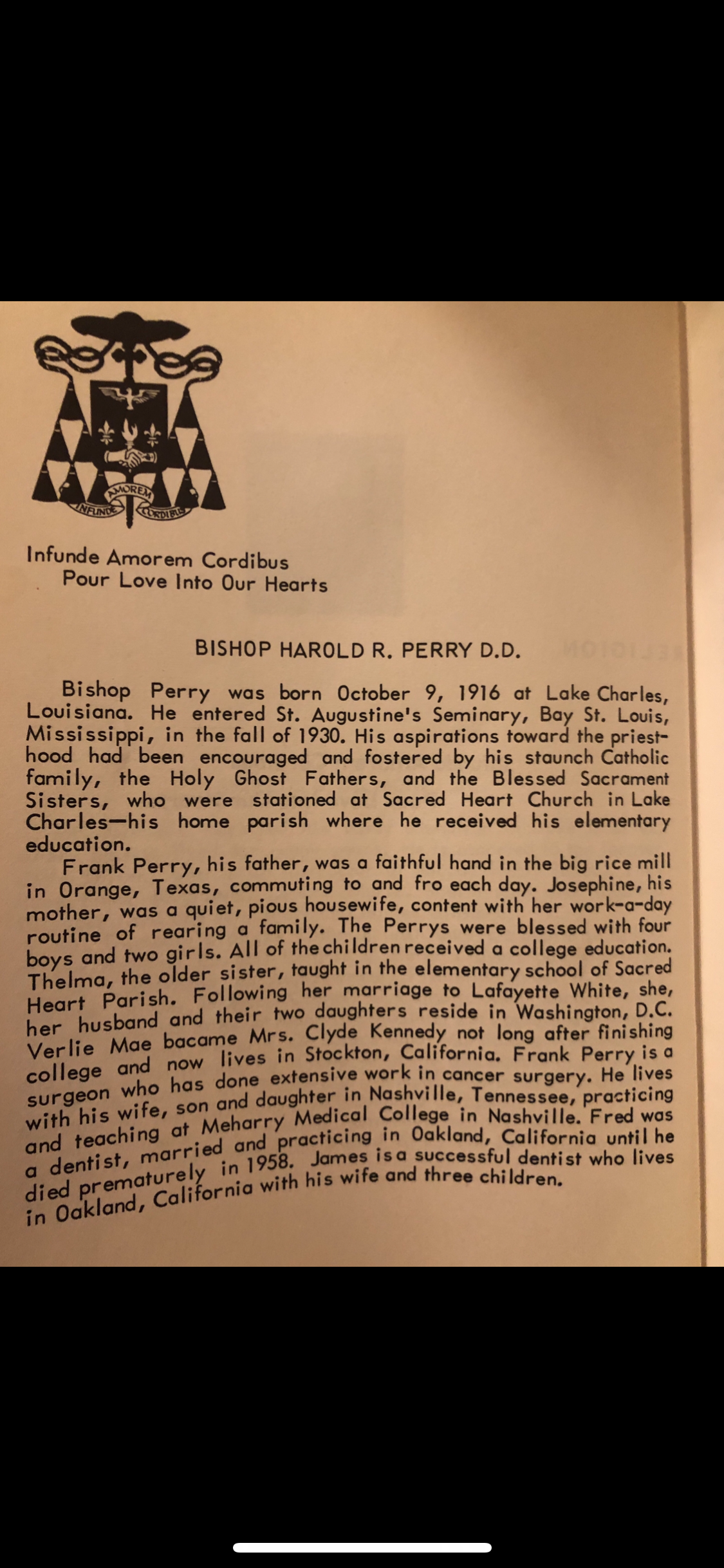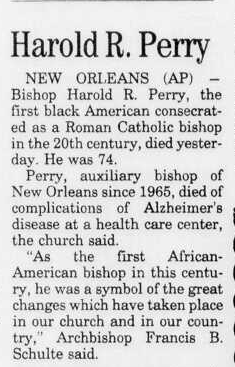Born in Lake Charles, Louisiana, to Frank J. Perry, a rice mill worker, and his wife Josephine, a domestic cook, the eldest of six children, he was raised in a devoutly Catholic and French-speaking home. At age 13, he entered the Seminary of the Society of the Divine Word in Bay St. Louis, Mississippi. He continued his studies at ecclesiastical institutions in Illinois and Wisconsin, taking his vows as a member of the Divine Word Society IN 1938.
Ordained to the priesthood on January 6, 1944, he was the 26th African American to become a Catholic Priest. Perry served as assistant pastor at Immaculate Heart of Mary church in Lafayette until 1948, when he was transferred to Notre Dame church in St. Martinville. He served at St. Peter's church in Pine Bluff, Arkansas and at St. Gabriel's church in Mound Bayou, Mississippi, before returning to Louisiana as founding pastor of St. Joseph's church in Broussard. During his six years as pastor, he built the church, rectory and school.
In 1958, Perry was named rector of his Alma Mater at the Divine Word Seminary in Bay St. Louis. Becoming more active in the civil rights movement, he joined the National Catholic Council for Interracial Justice upon its founding in 1960. Writing in the Catholic monthly Interracial Review in 1961, Perry wrote: "Catholic institutions could have won great respect among Southern Negroes if they had dropped segregation long ago. In many instances, segregation continues up to and including the Communion rail. We have missed a real opportunity to impress the Negro with the true attitude of the church." In 1963, he and other religious leaders were invited to the White House to discuss peaceful desegregation with President John F. Kennedy. Perry's tenure as rector came to an end in 1964, when he became Provincial Superior of the Southern province of the Divine Word Society in the United States. That same year, he also became the first African American clergyman to deliver the opening prayer in Congress.
On September 29, 1965, Perry was appointed Auxiliary Bishop for the Archdiocese of New Orleans by Pope Paul VI, becoming thus, the first African American of the modern era to become a Catholic Bishop. Announcing Perry's appointment, Archbishop Philip Hannan said, "We welcome the first American-born Negro bishop." However, Bishop James Augustine Healy, the son of a white plantation owner and a biracial slave, holds the distinction of being the first African American to be elevated to the Catholic Episcopate.
Perry's appointment was praised by many civil and religious leaders, including President Lyndon B. Johnson, whom Perry credited as having "accomplished more for our own people than any President since Lincoln." However, Perry declared, "My appointment is a religious one, not a civil rights appointment. My religious work comes first. I have no desire to work directly as a civil rights leader." He received his episcopal consecration with the Titular See of Mons in Mauretania on January 6, 1966 from Archbishop Egidio Vagnozzi, assisted by Archbishops Philip Hannan and John Cody serving. White protestors held a demonstration outside his consecration, and one woman described it as "another reason why God will destroy the Vatican."
During his episcopate, Perry served as pastor of Our Lady of Lourdes church and St. Theresa of the Child Jesus church in New Orleans, Vicar General of the Archdiocese, and Rector of the National Shrine of Our Lady of Prompt Succor. He lived in the Rectory on the grounds of Ursuline Academy, the oldest girl's school in the United States. For many years he also served as national chaplain of the Knights of Peter Claver. Monsignor Perry died due to Alzheimer's Disease complications at Wynhoven Health Care Center, Marrero, Louisiana, on July 17, 1991, aged 74.
Bishop Perry had requested to be interred in the Cathedral of St. Louis, however he was buried in St. Louis Cemetery No. 3, because church officials believed the vault space in the crypt below the Sanctuary was full. Archbishop Francis Schulte requested four tombs be constructed in St. Anthony's Garden behind the Cathedral and Bishop Perry was reinterred there. On March 1, 2001, when some empty crypt spaces were found inside the cathedral, Perry was ultimately buried according to his request.
Born in Lake Charles, Louisiana, to Frank J. Perry, a rice mill worker, and his wife Josephine, a domestic cook, the eldest of six children, he was raised in a devoutly Catholic and French-speaking home. At age 13, he entered the Seminary of the Society of the Divine Word in Bay St. Louis, Mississippi. He continued his studies at ecclesiastical institutions in Illinois and Wisconsin, taking his vows as a member of the Divine Word Society IN 1938.
Ordained to the priesthood on January 6, 1944, he was the 26th African American to become a Catholic Priest. Perry served as assistant pastor at Immaculate Heart of Mary church in Lafayette until 1948, when he was transferred to Notre Dame church in St. Martinville. He served at St. Peter's church in Pine Bluff, Arkansas and at St. Gabriel's church in Mound Bayou, Mississippi, before returning to Louisiana as founding pastor of St. Joseph's church in Broussard. During his six years as pastor, he built the church, rectory and school.
In 1958, Perry was named rector of his Alma Mater at the Divine Word Seminary in Bay St. Louis. Becoming more active in the civil rights movement, he joined the National Catholic Council for Interracial Justice upon its founding in 1960. Writing in the Catholic monthly Interracial Review in 1961, Perry wrote: "Catholic institutions could have won great respect among Southern Negroes if they had dropped segregation long ago. In many instances, segregation continues up to and including the Communion rail. We have missed a real opportunity to impress the Negro with the true attitude of the church." In 1963, he and other religious leaders were invited to the White House to discuss peaceful desegregation with President John F. Kennedy. Perry's tenure as rector came to an end in 1964, when he became Provincial Superior of the Southern province of the Divine Word Society in the United States. That same year, he also became the first African American clergyman to deliver the opening prayer in Congress.
On September 29, 1965, Perry was appointed Auxiliary Bishop for the Archdiocese of New Orleans by Pope Paul VI, becoming thus, the first African American of the modern era to become a Catholic Bishop. Announcing Perry's appointment, Archbishop Philip Hannan said, "We welcome the first American-born Negro bishop." However, Bishop James Augustine Healy, the son of a white plantation owner and a biracial slave, holds the distinction of being the first African American to be elevated to the Catholic Episcopate.
Perry's appointment was praised by many civil and religious leaders, including President Lyndon B. Johnson, whom Perry credited as having "accomplished more for our own people than any President since Lincoln." However, Perry declared, "My appointment is a religious one, not a civil rights appointment. My religious work comes first. I have no desire to work directly as a civil rights leader." He received his episcopal consecration with the Titular See of Mons in Mauretania on January 6, 1966 from Archbishop Egidio Vagnozzi, assisted by Archbishops Philip Hannan and John Cody serving. White protestors held a demonstration outside his consecration, and one woman described it as "another reason why God will destroy the Vatican."
During his episcopate, Perry served as pastor of Our Lady of Lourdes church and St. Theresa of the Child Jesus church in New Orleans, Vicar General of the Archdiocese, and Rector of the National Shrine of Our Lady of Prompt Succor. He lived in the Rectory on the grounds of Ursuline Academy, the oldest girl's school in the United States. For many years he also served as national chaplain of the Knights of Peter Claver. Monsignor Perry died due to Alzheimer's Disease complications at Wynhoven Health Care Center, Marrero, Louisiana, on July 17, 1991, aged 74.
Bishop Perry had requested to be interred in the Cathedral of St. Louis, however he was buried in St. Louis Cemetery No. 3, because church officials believed the vault space in the crypt below the Sanctuary was full. Archbishop Francis Schulte requested four tombs be constructed in St. Anthony's Garden behind the Cathedral and Bishop Perry was reinterred there. On March 1, 2001, when some empty crypt spaces were found inside the cathedral, Perry was ultimately buried according to his request.
Sponsored by Ancestry
Advertisement
Advertisement
